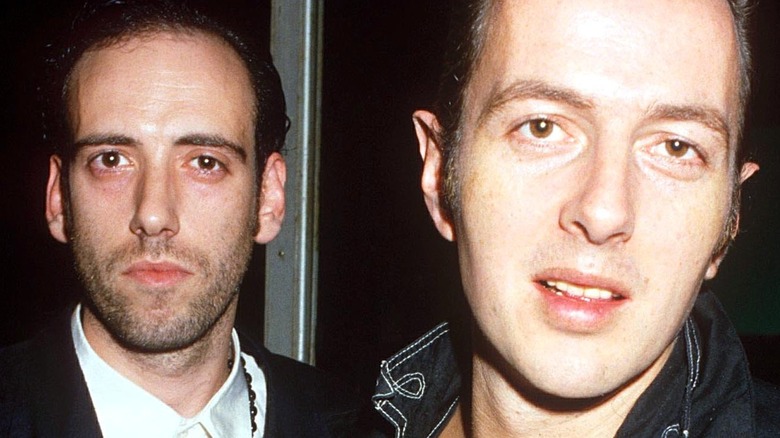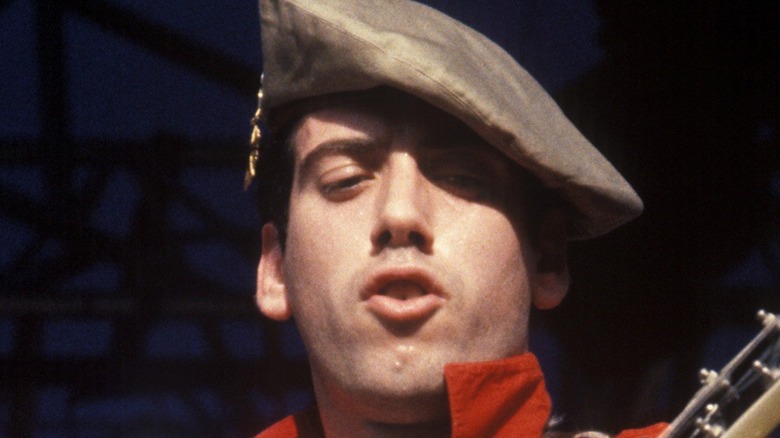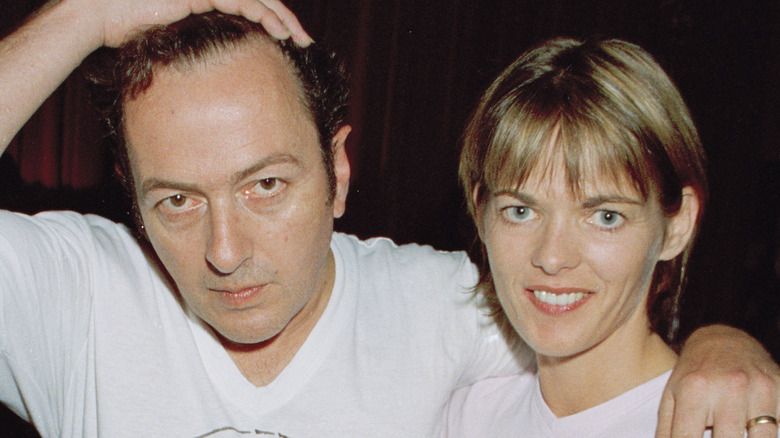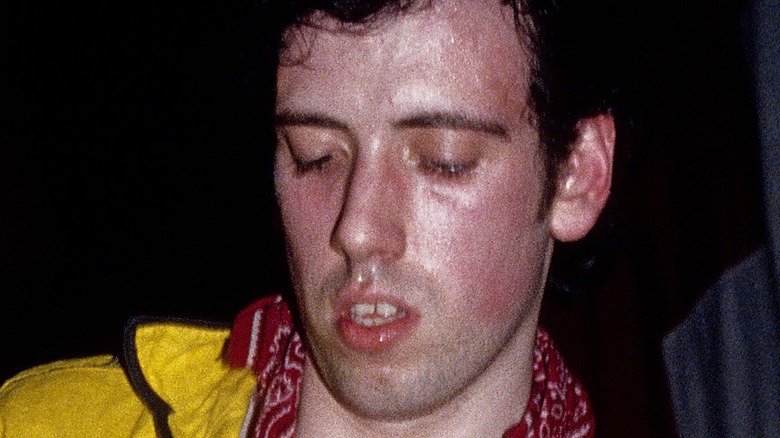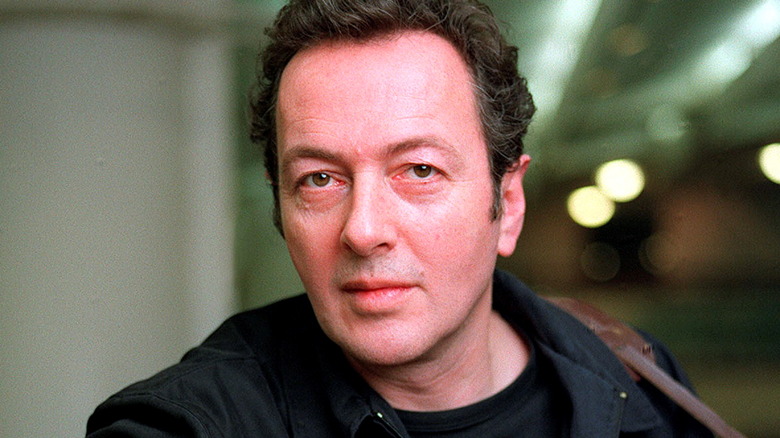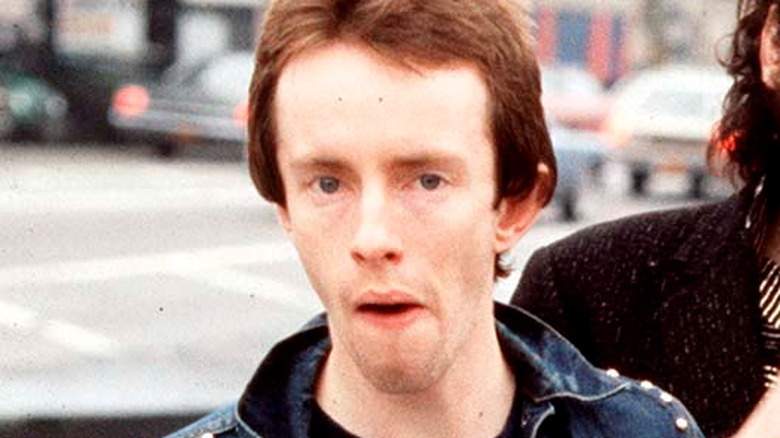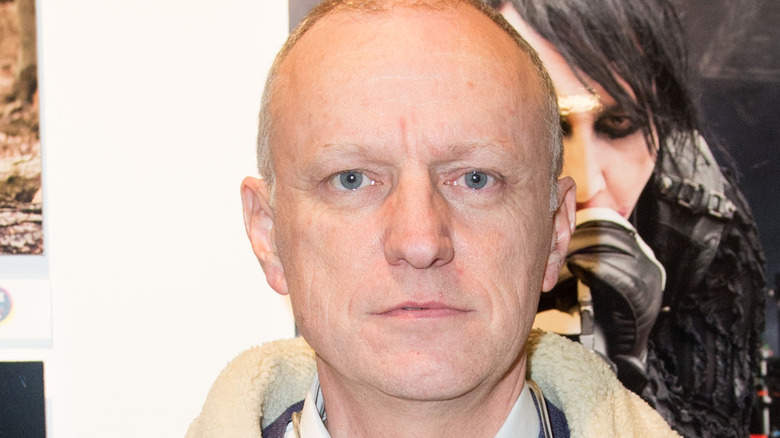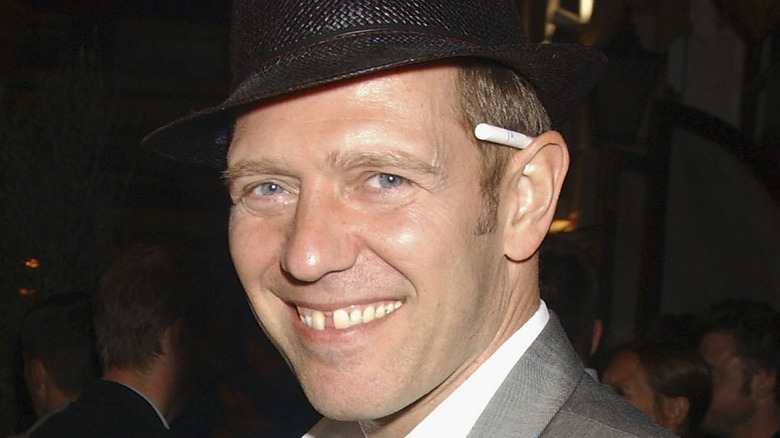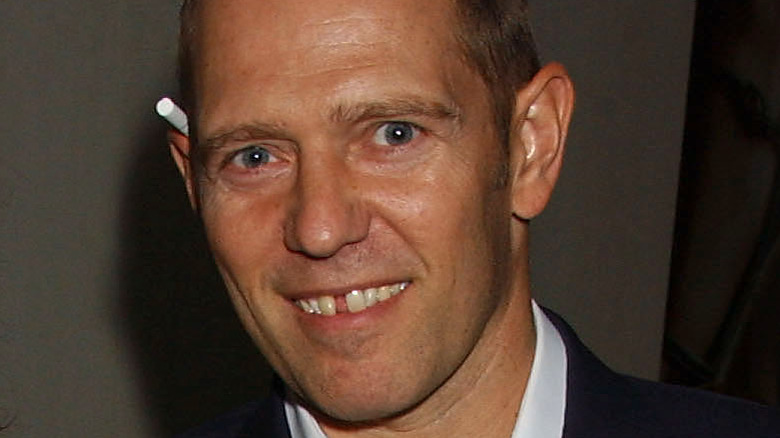Tragic Details About The Clash
During their late 1970s and early 1980s heyday, pioneering United Kingdom punk band The Clash claimed to be only band that matters" (via KEXP). And for some time, and in many ways, they were right. During a time of tremendous political upheaval and social unrest in Britain, The Clash, particularly through its main singer-songwriters Joe Strummer and Mick Jones, voiced the concerns of the dissatisfied working class through political, polemic-like lyrics calling out the class system and calling for revolution. The medicine went down with sweetness, however — guitar-driven rock that started out as three-chord punk but which quickly evolved into a sound all The Clash's own, incorporating American R&B, as well as reggae, dance music, disco, and hip-hop.
After generating a much-heralded classic album with "London Calling," and churning out foundational alternative rock singles like "Rock the Casbah," "London's Burning," "Spanish Bombs," "Train in Vain," and "Should I Stay or Should I Go," The Clash fell apart and dissolved in 1986. The personal and off-record lives of The Clash were just as dramatic, if not fraught with peril. Here's a look into some of the tragic things to ever happen to The Clash and its many members.
Mick Jones was raised by a refugee grandmother
According to Marcus Gray's "Route 19 Revisited: The Clash and London Calling," future Clash guitarist and co-frontman Mick Jones experienced an early childhood marked with familial instability and the shadows of trauma. From the age of 8, as per The Guardian, Jones, born Michael Jones in 1955, was raised by his grandmother, on account of his parents' divorce and their subsequent abandonment of him.
His grandmother was born in 1899 to Russian Jewish parents who fled to England around that time. In the latter part of the 19th century, Russia enacted a series of "pogroms," which translates to "wreaking havoc," according to History, and that's exactly what it was — the state-sponsored, systemic violence and murder of Jewish people.
As Gray details, at age 19, Jones' mother, Renee, snuck onto a Unites States-bound ship but was found and sent back to England, where she married Welsh taxi driver Tommy Jones. The marriage quickly grew hostile and was characterized by fighting. By 1964, they'd divorced, Tommy Jones moved to the outskirts of London alone, Renee Jones moved to the U.S. and remarried, and Mick remained at the family home with his grandmother.
Joe Strummer's perilous romantic and family life
When he wasn't making music about society's myriad problems, The Clash frontman and songwriter Joe Strummer conducted several romantic affairs and relationships, and much of his personal, off-stage life was fraught with chaos, tension, and complexity. According to Chris Salewicz's "Redemption Song: The Ballad of Joe Strummer," Strummer, then going by the name Woody Mellor, started dating in a Spanish woman named Paloma Romero. Her visa was about to expire in 1975, and wishing to remain in the U.K., she tried to arrange a marriage with Mellor. He was amenable to the idea, but he couldn't because he'd already gotten married earlier that year and for a similar reason — he'd wed a South African emigre named Pamela Jill Moolman so she could obtain U.K. residency.
In 1978, after The Clash had found some success, Strummer began dating Gaby Salter, a friend of bandmate Topper Headon's girlfriend, and who was 17 when she moved in with the guitarist. In January 1986, 10 days after Salter gave birth to the couple's second child, and weeks after Strummer learned that his mother's cancer diagnosis had grown near terminal, Gaby's brother, Nick Salter, died by suicide.
Strummer and Gaby Salter would remain a couple for decades but never marry. He carried on dalliances and extramarital affairs, including one with Lucinda Tait, whom Strummer would marry in 1995.
Joe Strummer's extensive rap sheet
As a writer of and mouthpiece for anti-establishment punk rock The Clash, frontman Joe Strummer frequently clashed with authority and broke the law. According to Chris Salewicz's "Redemption Song: The Ballad of Joe Strummer," Strummer was busking at London's Oxford Circus train depot in the early 1970s when he heard a loudspeaker announce that police where en route to arrest him for illegally performing, a moment that fed his social news. Late in the decade, per The Independent, Strummer was apprehended for stealing a hotel's pillowcase, and, with drummer Topper Headon, for spray-painting "The Clash" on a different hotel's wall (per "Punk Diary" by George Gimarc).
In 1978, Strummer became so incensed with bouncers roughing up audience members during a show at Glasgow's Apollo Theater that he pulled the band off the stage and was confronted by fans who wondered why he didn't intervene more aggressively. "He was so angry he smashed a bottle and was immediately jumped on by plainclothes policemen," Mick Jones told The Daily Record. Bassist Paul Simonon was additionally struck with a police baton and arrested, too. Two years later, Strummer would face charges for another concert incident. During a gig in Hamburg, Germany, in 1980, multiple fans grabbed the mic to accuse The Clash of selling out, prompting an angry Strummer to hit one of them in the head with his guitar. That earned him an assault charge.
The Clash fired Mick Jones
In 1983, The Clash was still basking in the glow of its 1982 hit album "Combat Rock," which spawned two of its best known and most successful singles ever: "Should I Stay or Should I Go" and "Rock the Casbah." Both songs prominently featured Clash guitarist and vocalist Mick Jones, who in September 1983, would lose his position in the band.
Overall, it was a rough period for the band, having fired drummer Topper Headon and seeing his replacement, Terry Chimes, quit after a year, according to Far Out. As "Combat Rock" turned The Clash into a mainstream success, Joe Strummer and Paul Simonon wanted to cash in with a huge tour; Jones didn't, seemingly burned out and exhibiting selfish behavior. "Mick was intolerable to work with," Strummer said in the documentary "Westway to the World" (via Far Out). "He wouldn't show up. When he did show up, it was like Elizabeth Taylor in a filthy mood." Jones later confirmed that assessment and laments it. "I was just carried away really, I wish I had a bit more control," Jones said.
Strummer endeavored to detoxify the work environment by getting rid of what he thought was the problem. "We had to change the team because the atmosphere was terrible," he said in "The Rise and Fall of the Clash" (via Far Out). Jones was so unreliable, that, with the support of Simonon, who was no longer communicating with the guitarist, Strummer had him fired.
Joe Strummer died at age 50
The son of British parents, one of whom was a diplomat, according to The Guardian, John Mellor grew up middle class and became Joe Strummer, the voice of a generation. He was one of the most vocal and politically outspoken musicians in punk, which took off in popularity and influence during economic recession and the conservative tenure of prime minister Margaret Thatcher in the late 1970s, notes The Boar. After playing in a cover band called the 101ers, as per NME, he formed The Clash and operated as co-frontman with Mick Jones until he fired him in 1983, and the band broke up soon thereafter. Following his time in The Clash, Strummer fronted the Pogues and the Mescaleros.
In 2002, The Clash were voted into the Rock and Roll Hall of Fame, but Strummer wouldn't live to attend the ceremony or reunite with his old bandmates. His website broke the news that he died on December 22, 2002, at his home in Somerset, England, of what was initially believed to be a heart attack. Three days later, according to NME, Somerset coroner Michael Rose released the results of a postmortem examination, confirming that the cause of death was cardiac arrest suffered after Strummer returned home from walking his dog, collapsed, and couldn't be revived. Strummer was 50 years old.
Keith Levene died from liver cancer
London-based guitarist Keith Levene (born Julian Levene, according to The Guardian) was a founding member of two important British rock bands, one punk and the other post-punk. At age 18 in 1976, Levene got together with bassist Paul Simonon and guitarist Mick Jones to form the first incarnation of The Clash, recruiting singer and guitarist Joe Strummer. That first collective got a record deal, according to AllMusic, and its first album, the self-titled 1977 release "The Clash," included "What's My Name," a song co-written by Levene. By that point, Levene had actually left the band (as he wasn't thrilled about the hyper-political direction the band was slowly adopting, notes The Guardian.
In 1978, the Sex Pistols, the band that strongly influenced The Clash, split up, leaving frontman Johnny Rotten (or John Lydon) free to start the experimental, reggae-influenced dance-rock project Public Image Limited. He immediately recruited Levene, who helped establish the group's unique sound, heard on hit U.K. records like "First Issue" and "Metal Box." Levene left PIL in 1983, moved to Los Angeles, and worked with rap acts and the Red Hot Chili Peppers.
On November 11, 2022, as reported by the BBC, Levene died. According to his friend, PIL biographer Adam Hammond, Levene had received a liver cancer diagnosis two years earlier. The guitarist was 65 years old.
Topper Headon's drug addictions got him kicked out of the Clash
According to AllMusic, drummer Nicholas "Topper" Headon joined The Clash in 1977, just in time for their first album, but the relentless schedule led to a premature end to his marriage. That's also when he developed substance abuse issues. "I went on the road and discovered booze. All I did was drink, drink, drink. Then Mick [Jones] turned me onto coke and all I did was coke," he said (via The Independent).
By the early 1980s, Headon took to doing drugs during concerts, snorting cocaine between songs. After The Clash's roadies introduced him to heroin, the band forced Headon into a drug rehab program in 1982. He resumed his cocaine use during a European tour and earned a suspension from the band, but then Clash singer Joe Strummer let slip to a reporter that he'd actually fired Headon for his destructive drug use.
His dismissal became the inciting incident for even more drug use, and a switch from cocaine to heroin. "I just stuck needles in my arm, which I'd never done before," he said. By the late 1980s, Headon had so exhausted his funds from The Clash, on drugs, that he took a job as a cab driver, and then a busker, banging on bongos in the London Underground subway station. "Every hundred people who passed, there'd be one who'd stop and ask, 'Are you Topper Headon from the Clash?'" he recalled. "It was so humiliating."
Topper Headon had many health issues
Clash drummer Topper Headon grappled with addictions to alcohol, cocaine, and heroin for decades, and according to Kent Online, he attained lasting sobriety in 2004, which he told The Independent was his 13th attempt. The drummer suffered from numerous other health problems, related to his substance abuse or his chosen profession.
After his time in The Clash, Headon moved back to his hometown of Dover, briefly quitting intravenous heroin and replacing it with large amounts of alcohol, which he'd consume in local bars, according to The Independent. During his time, his doctor diagnosed him with hepatitis C, a viral infection commonly found among IV drug users in the 1980s and which can lead to liver failure — which can also be triggered by voluminous alcohol consumption. Headon quit drinking so much and took up heroin again. Upon kicking drugs, he formed a Narcotics Anonymous chapter as well as a support group for people suffering from hepatitis C, and then became the spokesperson for the U.K. charity The Hepatitis C Trust.
In 2009, Headon entered another rehab facility, this one focused on physical rehab, to alleviate constant back pain, which he developed over years spent as a drummer with poor posture — but which he didn't notice until after he'd cleared drugs out of his system in 2004. "Almost all professional drummers end up with problems," Headon told The Daily Mail of his chronic back pain. Headon was treated for scoliosis, or curvature of the spine, with a rigorous, two-week, seven-hour-a-day treatment regimen.
Multiple latter-day bandmates of Terry Chimes tragically died
Terry Chimes played the drums for The Clash during two separate stints: from 1976 to 1977, and 1982 to 1983, according to Metal-Rules. After his time with the band, Chimes went on to play with Johnny Thurnders. Sadly, his bandmate would die an untimely death. According to Louder, Johnny Thunders' body was found on April 24, 1991, in a New Orleans hotel. The coroner's office judged the cause of death to be an accidental overdose of cocaine and methadone. Thunders, born John Genzale, was 58.
While Chimes was on tour with thunders in the mid-1980s, he also got to know Finnish hair metal act Hanoi Rocks. As he relates to Metal-Rules, Chimes essentially became a stage-only member of Hanoi Rocks during that time, sitting on drums for a few songs each concert. He played one Hanoi Rocks show proper in late 1984 — a tribute to the band's full-time drummer Nicholas Dingley, known professionally as Razzle. On December 8, 1984, according to Ultimate Classic Rock, Razzle got into a car driven by Vince Neil of Motley Crue, already intoxicated when he went on a liquor store run in the middle of a party in Hollywood. Neil mismanaged a turn and crashed into another vehicle. Razzle was pronounced dead on arrival at South Bay Hospital, at the age of 24.
Paul Simonon was arrested for environmental activism
Paul Simonon played bass for The Clash, and in defiance of the group's many lineup changes, was the only musician to be around for the band's entire history, from 1976 to 1986, per AllMusic. Following the band's dissolution, Simonon played bass on Bob Dylan, Allen Ginsberg, and Havana 3 A.M. records, before devoting a lot of his time, effort, and labor to environmental causes. His involvement with one high-profile and particularly assertive organization would lead to his arrest.
In 2011, according to the Greenpeace blog, Simonon quietly and anonymously joined the crew of the Esperanza, a ship that's part of the fleet of environmental organization Greenpeace. The vessel was headed to the Arctic Circle to protest or even stop drilling for oil in the region, and Simonon told the rest of the crew that he was just a guy named Paul, hired as an assistant cook. Then, when Esperanza arrived at its intended destination, the crew members, Simonon among them, illegally invaded an oil rig and climbed to the top of it, requesting that the oil company that owned it disclose its oil spill response protocol, in the event of such a disaster. Police from the nearest jurisdiction, Greenland, made their way out to the oil rig and arrested the protestors, including Simonon. He spent two weeks in jail.
There could have been a couple of Clash reunions
The Clash were only together for a relatively scant 10 years, during which time they produced six studio albums and released several singles that hit the U.K. top 40, and two that hit the U.S. top 40 ("Train in Vain" and "Rock the Casbah). For hardcore fans of The Clash and its punk rock that evolved into new and daring places, it's a tragedy that there isn't any more music — but there could have been.
In the early 2000s, the tensions that led to the breakup of The Clash a decade and a half earlier had thawed to the point where the members of the most successful lineup were all in touch. Joe Strummer, Mick Jones, Topper Headon, and Paul Simonon even discussed reuniting in some fashion. "Everybody seemed quite interested in the idea, but I wasn't," Simonon told Uncut. "I'd rather me and Joe worked together again in another project, rather than go the easy route and reform something that was quite special and unique to that time." Despite Simonon's protests, The Clash had a one-time-only reunion gig in the works. In 2002, they were voted into the Rock and Roll Hall of Fame, according to The Guardian. But then Strummer died after the announcement but before the band's induction, meaning a true and full reunion of The Clash would never come to pass.
